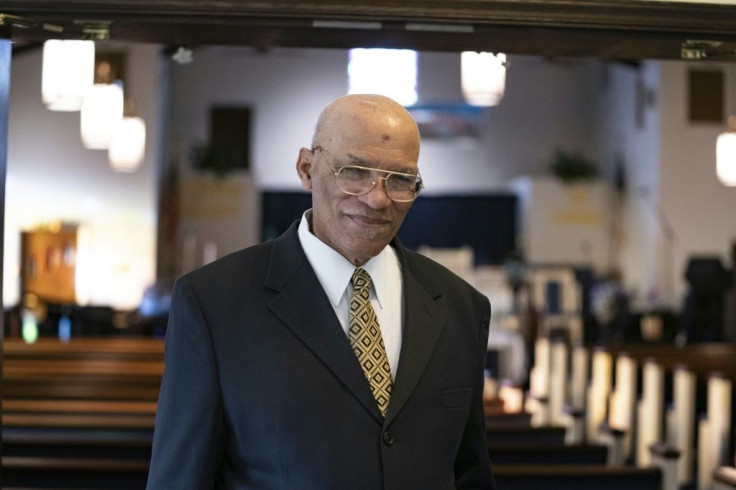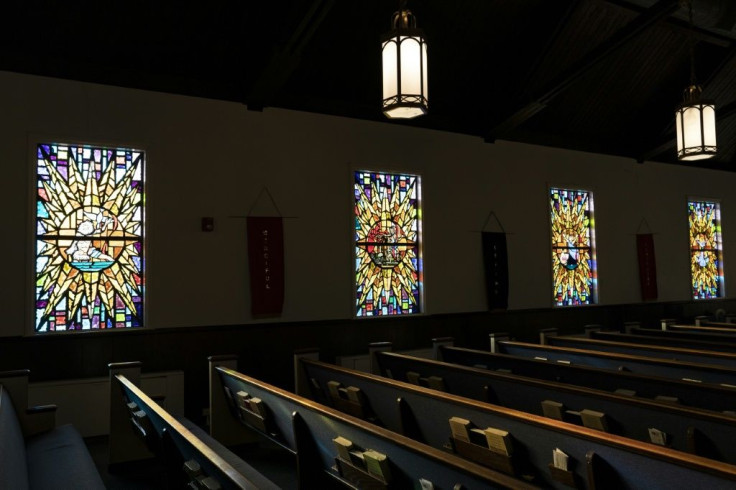A Baltimore Church Defies Virus Order But Few Are Coming

In his red-brick Baltimore church, Pastor Alvin Gwynn waits patiently for his flock to arrive on this Easter Sunday.
But whether from fear of the coronavirus or of the authorities, not many have shown up.
"This is the Christian way of worshiping," says Gwynn, whose church is in a mainly African American neighborhood of this large port city not far from Washington. "We are told to gather."
The pastor's stance amounts to an act of civil disobedience in the time of the coronavirus -- a time when most church leaders have turned to live-streaming their services.
With the death toll from COVID-19 now above 20,000 in the United States, the state of Maryland -- where Pastor Gwynn's Friendship Baptist Church is located -- has banned all gatherings of more than 10 people.
"Spiritual (and) religious" gatherings are specifically included in the ban.
And the state has put some teeth in its order: violations are punishable by up to a year in prison and a fine of $5,000.
But Pastor Gwynn insists he is unfazed.
"They won't arrest me," says Gwynn, a trim, bespectacled black man who has been preaching in his neighborhood for more than 30 years.
"It would be like sending Martin Luther King back to jail."
Regardless, the problem resolved itself Sunday: fewer than 10 congregants showed up for the morning's first service.
"There has been a lot of intimidating factors," said Nicole, a church member who declined to give her last name.
She added a bit nervously that "it's probably safer to come here than to the grocery store."
But another attendee, 67-year-old retiree Linda Butler, seemed to share some of the pastor's defiance. "If I am going to die, I am going to die," she said, wearing a mask and a bright yellow hat. "So what? It's up to God."

Mark Griffin, who provides security for the church, said the pastor's stance had provoked angry posts online -- "a lot of negative stuff on social media" -- denouncing him as irresponsible.
In the United States as elsewhere, churches and other places of worship -- bringing hundreds of people together in close proximity -- were a source of the virus's spread in the early days of the pandemic.
More than 70 members of a mega-church in Sacramento, California have tested positive; a popular Episcopal priest was one of the first people confirmed with the virus in Washington; and in a New York suburb, a synagogue was one of the earliest COVID-19 hotspots.
For the past month, large gatherings have been banned in most of the country, though several conservative states, including Texas and Florida, have granted exemptions to churches.
Mindful of the risk to their flocks, most church leaders have gradually bowed to the reality that in-person services are too risky for now.

As recently as March 15, nearly two-thirds of Protestant pastors were still holding in-church services; but by March 29, only seven percent were doing so, according to a survey by Christian polling group LifeWay Research.
Most are now live-streaming their services.
That is how President Donald Trump said he would be following the Easter service of a Texas preacher, Robert Jeffress, a prominent Trump supporter.
The president recently said that watching a service on the Internet was "terrific," but he added that "online is never going to be like being there."
Less common than online services but just as innovative, some churches are offering a "drive-in" option, inviting their faithful to attend services from their cars, parked in big parking lots.
But a small number of priests and pastors have resisted government orders in the name of religious freedom, a bedrock principle at the heart of the American identity.
"I have a First Amendment right," Pastor Gwynn said, referring to the constitutional guarantee of religious freedom.
"They can't impede our service... They can't come to the church and arrest me."
He added, "We are not in a police state."
Not everyone agrees with that interpretation.
"The pastor is not correct," said Jeffrey Shulman, a professor of law at Georgetown University in Washington.
"The police power of a state would be at its apex in a health emergency."
He acknowledged, however, that the sight of police entering a church to enforce health regulations might not go over well.
"The optics would be very bad, right?" he said.
So for now, officials are relying largely on the power of persuasion.
"We're not going to enforce our way out of this," Louisiana Governor John Bel Edwards said recently, in the face of a defiant pastor in the city of Baton Rouge who is continuing to bus hundreds of the faithful to his church.
"I am still calling upon him to be a leader," the governor said.
But in Baltimore, Pastor Gwynn has turned a deaf ear to such pleas.
The virus may be "scaring people away," he says. "But we don't need a crowd to worship."
© Copyright AFP {{Year}}. All rights reserved.





















